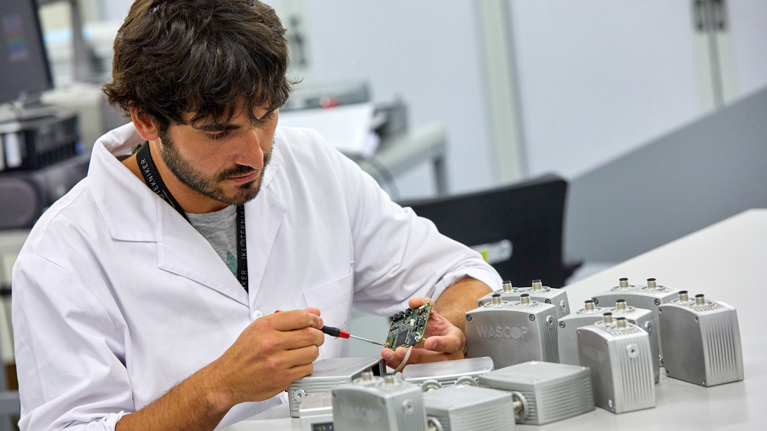Technological water-saving solutions at solar thermal power stations
IK4-TEKNIKER is developing technological solutions to optimise cleaning operations at solar thermal power stations to reduce water consumption between 70 and 90%.

These are several technologies that use sun radiation to produce power. One of the most popular technologies is called CSP (Concentrated Solar Power) that uses mirrors or lenses to concentrate a large amount of solar light on small surfaces.
Some outstanding features of concentrated solar power or CSP are that it produces less environmental impacts, less CO2 emissions and less waste compared to other non-renewable energy generation technologies.
Certain plants are located, however, in places where solar radiation is suitable to produce power but where there is very little water, a major obstacle as regards the growth of this technology.
In this context, IK4-TEKNIKER is involved in the WASCOP project (Water Saving for Concentrated Solar Power) whose aim is to develop innovative solutions to save water at solar thermal plants by using different optimisation technologies and strategies.
To achieve this goal, the project is focused, on the one hand, on reducing water consumption by implementing cooling process that are more efficient and sustainable and hybrid cooling methods (dry/humid) for plant cooling.
And, on the other, on defining new cleansing strategies based on three key objectives, namely: reducing optical cleansing requirements on reflecting surfaces; compiling more knowledge on the degree of soiling of a solar field and optimising cleansing systems.
The IK4-TEKNIKER contribution
The technology centre´s work is focused on managing cleansing strategies for optical surfaces, on advising other partners involved in this project and delivering specific solutions in this area.
The first solution delivered by IK4-TEKNIKER has consisted in developing an anti-soiling coating for mirror surfaces to prevent soiling. In this manner, and compared to conventional mirrors, water consumption can be reduced by 50-75%, without modifying any optical properties.
The second solution adopted by the technology centre consists in developing a low cost sensor that can identify the degree of soiling on a real time basis and ascertain how necessary it is to clean a mirror. As it is a low-cost sensor, it can be placed in strategic locations at power stations to perform exhaustive monitoring of areas that are more susceptible to being cleaned.
The third solution consists in a non-immersion ultrasound system that generates water cavitation to drags dirt and recovers 98% of a mirror´s reflectance to achieve a six-fold reduction in water consumption.
Efficient solutions
The main advantage of the first solution compared to those already available on the market is the durability of the coating as, nowadays, no coatings have life cycles in excess of one year at solar thermal power stations.
To develop this solution, IK4-TEKNIKER is working on key technologies such as Sol Gel to incorporate anti-soiling functionality to mirrors. In order to achieve this, surfaces have been modified, characterised and validated.
IK4-TEKNIKER specialises in the comprehensive development of robust, stand-alone, miniaturised sensors. Therefore, and in the second solution that has been developed, the device that identifies the level of soiling is a low-cost, compact, embeddable and highly sensitive sensor that is also equipped with communication systems allowing standardised information to be exchanged with other systems or devices.
The third system developed by the technology centre, the ultrasounds cleaning system, cannot only be used to clean mirrors at solar fields but can also be applied to many surfaces such as flooring, a highly interesting option for a number of sectors such as urban or industrial maintenance in which cleaning devices that consume very little water are developed for very large components.
In order to review the efficiency of these solutions as well as the environmental (economic) benefits obtained, the systems developed to date shall be demonstrated in a laboratory setting and subsequently be tested and validated under real operating conditions at the Solar Platform in Almería (PSA-CIEMAT) at the CSP NOOR plant in Ourzazate, Morocco.
The WASCOP project that lies within the framework of the European, Horizon 2020 project that will finish at the end of 2019, has a budget close to six million Euros and a consortium that includes universities, SMEs, industries and technology centres.
This project has received funding from the European Union’s Horizon 2020 research and innovation programme under grant agreement No. 654479.
